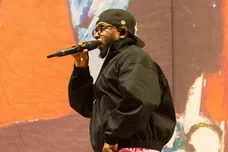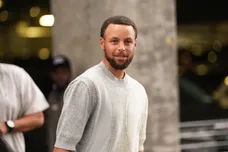“Rumor has it, The Blueprint, classic,
Couldn’t even be stopped by Bin Laden”
- Jay-Z, "The Bounce"
Jay-Z’s The Blueprint was a masterclass in art direction. From the blue-tinted jewel case to the crisp liner artwork, every element of Jay’s sixth solo album possessed a uniform sense of cohesion. Eschewing his collaborative-heavy modus operandi, The Blueprint included no features, save for one unlikely contributor - Eminem, coming off the release of D12’s Devil’s Night. The Roc-A-Fella emcees previously showcased on Roc-La-Familia were nowhere to be found, though the Roc’s presence permeated nonetheless. In-house talents Just Blaze and Kanye West found themselves playing a pivotal role in shaping the album from behind the curtain. While many fans cite Kanye West’s glory days with College Dropout fixed in mind, the origins of his soulful aesthetic truly came of age on The Blueprint. Yet what might have become of Ye’s offerings without Jay’s tour-de-force turn as a lyricist possessed? Such is but one of many reasons why The Blueprint remains one of the most important albums in hip-hop history.
Forget The Carters, or even 4:44, for a moment. In 2001, Jay-Z was a different man entirely. At least, the narrative surrounding him was a far cry from the business mogul of today. Embroiled in heated rap feuds with Nas and Mobb Deep, Jay was hungrier than modern fans might have imagined. While the excitement of feuds like Pusha T vs. Drake or Eminem vs. Machine Gun Kelly remains invigorating, the era of Jay-Z and Nas was truly something to behold. In that sense, Blueprint opens on a hostile note, though Jay never foregoes charisma. Taking to an iconic Doors sample, Jay aired his grievances with Nasir Jones and the late Prodigy, reaching for a crown while swatting grabby hands like rolling-pin-toting nonnas.
"Izzo" made for a refreshing single, in an era where albums came to be defined by their lead offering. With a soulful, near-endearing instrumental and a hustler's cool reflection, Jay-Z deftly towed the line between commercially viable leading man and alleyway backhand specialist. And while "Girls, Girls, Girls" may never have survived into today's social climate, Jay's reflection on his list of culturally diverse suitors plays out like the finest in lyrical slapstick. Within the project's first quarter, we've already experienced a wide variety of disparate sounds, though none feel out of place; such issues may have permeated the Volume series, but Blueprint remained anchored from the jump.
Driven largely by soulful vocal samples, save for bangers like "That N***a Jigga" and "Hola Hovito," Hov spent the bulk of the project reflecting on the state of his affairs. Themes of masculinity are touched on "Song Cry," while hustler's ambition earns a quintessential anthem on the Just Blaze-produced "U Don't Know." Even Em's turn on "Renegade" came to make history, pairing two viable GOAT contenders together for a nonstop slew of poignant reflection. "Do you fools listen to music, or do you just skim through it?" he ponders, a question that still holds relevance today. Such subtlety is Jay's finest attribute, as he packs even the simplest reflections with dense street philosophy.
It's hard to argue that Blueprint is one of the millennium's definitive albums. In several ways, it's Jay-Z's best, though many are willing to live and die by his debut effort. Despite where you may feel it falls amidst his personal catalog, understand that The Blueprint cemented Jay-Z as a genuine GOAT contender. Cohesive, challenging, and quotable, Jay's legendary project will forever remain a fixture in music history. Today, on a day tainted by tragedy, it's comforting to know that Jay-Z decided to put his best foot forward. Shout out to The Blueprint, a classic in every sense.







